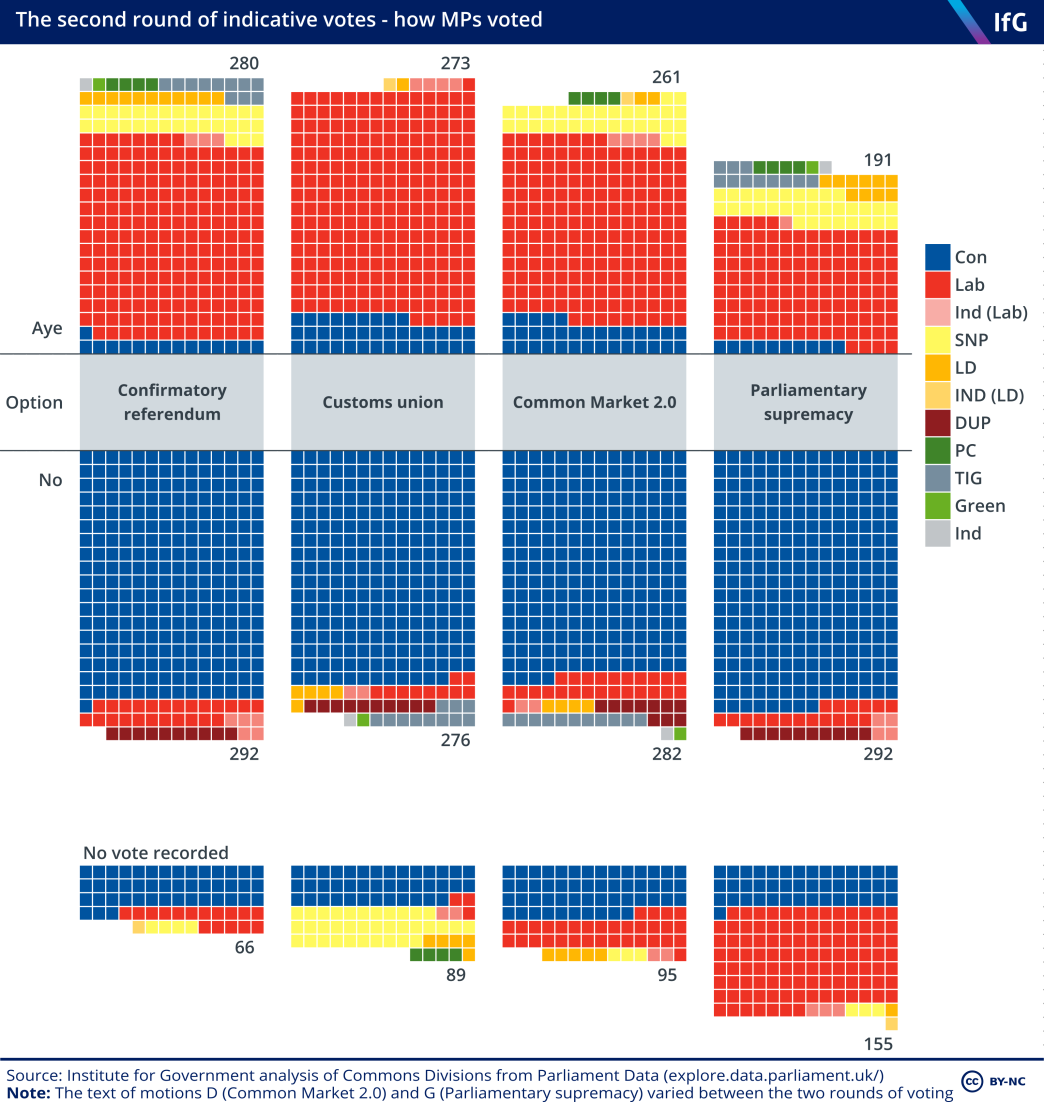Parliament once again rejected all Brexit options
MPs may have run out of time to compromise and combine the options on offer.
While the Prime Minister appears to have little room to manoeuvre, MPs may have run out of time to compromise and combine the options on offer. Maddy Thimont-Jack picks out three takeaways from the indicative votes.
1. Soft Brexit options are still falling short
None of the four different Brexit options – narrowed down from the eight the previous week – voted on by MPs has secured a majority.
Two of these had been tweaked by their proponents to try and appeal to more MPs. Nick Boles’ ‘Common Market 2.0’ – membership of the European Economic Area and the European Free Trade Association, as well as a de facto customs union with the EU – was arguably the most successful. With the Labour party and SNP choosing to whip in favour of this option, Boles was able to increase the number of MPs supporting this option from 189 to 261.
The customs union option saw the closest result, with Ken Clarke’s proposal defeated by a margin of just three this time around.
However, as the clock ticks down to 12 April there may not be enough time, or even another opportunity, to build a stable majority around any of the soft Brexit options.
2. MPs are still refusing to compromise
A large reason behind the failure of any option to secure majority is because MPs are still refusing to compromise. As the Institute for Government has previously argued, MPs were going to have move if the indicative votes process had any chance of producing an alternative to the Prime Minister’s deal.
This appears to be an issue in particular amongst remain-supporting MPs. Some of the options on the table are compatible – it would be perfectly possible, for example, to put a deal which includes a customs union, or which sets out Common Market 2.0, to a confirmatory referendum – but, so far, some MPs remain entrenched in supporting their preference, and their preference only. It would also have been possible to support the proposal to take no deal off the table by supporting that motion alongside both a softer Brexit and a referendum.
But despite appeals from MPs such as Ken Clarke to think beyond their first preferences, some MPs did not budge. The SNP and around half the Liberal Democrats abstained on the customs union vote. The Independent Group and most of the rest of the Lib Dems actively opposed the motion. While Nick Boles resigned the Conservative Whip citing frustration with members of his own party, he could have been equally frustrated with those onthe benches opposite.
Jacob Rees Mogg, Chair of the European Research Group, ended up compromising to support the Prime Minister’s deal last week, but members campaigning for a People’s Vote were unwilling to accept even the softest version of Brexit.
3. No deal remains the legal default without compromise
The votes also underlined the scale of Theresa May’s challenge. On 29 March she reduced the number of Conservative MPs opposing her deal from 118 in January to just 34. But one of the key messages emerging from the indicative votes process is that most Conservative MPs are opposed to a softer Brexit.
Any move by the PM to appeal to MPs who are willing to support a softer Brexit therefore risks losing her some of the Tory backbenchers who have shifted their position to support her deal (for example, Jacob Rees Mogg). At the same time, simply putting the same deal back in front of Parliament again seems unlikely to get her a majority, given the 34 Conservatives who opposed her and the continued opposition of the DUP.
So while the indicative votes have shown a reluctance to compromise amongst MPs who would prefer a soft Brexit or remaining in the EU, the Brexiteers who prefer no deal to any other option before Parliament also show no signs of budging. The legal default is no deal. Until Parliament says yes to something, this group can just keep on saying no until they get what they want.

- Topic
- Brexit
- Keywords
- Parliamentary scrutiny
- Publisher
- Institute for Government